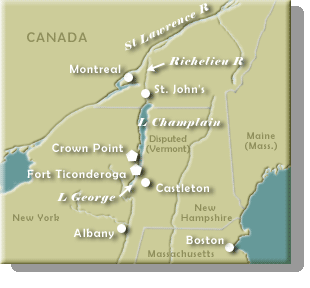In the wake of the skirmishes at Lexington and Concord in April 1775, American leaders began to put into motion plans for aggressive action. Samuel Adams and others had been convinced that when war came, the British would attempt to isolate New England from the other colonies. The most obvious method of doing so was to send an army southward from Canada over the 'superhighway' of the era — up the Richelieu River to Lake Champlain, then to Lake George, the Hudson River and on to New York City while capturing strategic points along the way. Adams was serious enough about this concern that he dispatched an agent to Canada to assess the population's loyalties. He hoped that the Canadians, especially those of French descent, might join the rebellion. The agent did not provide an encouraging report, however, noting that Yankees were probably more hated in Quebec than the British, who had improved relations markedly through the Quebec Act in 1774. Rebel leaders turned to consideration of a more modest strike against the British. Fort Ticonderoga, a major point of contention during the French and Indian War, was now an inviting target for several reasons:
 The two leaders, neither lacking in self-esteem, resented the other’s presence and the issue of overall command was never settled. Despite their frequent bickering, a surprise attack was made on Ticonderoga in the early hours of May 10. A band under Allen crossed Lake George and marched silently to the fort when they were astounded to see the gate open and the sentry asleep. No shots needed to be fired. The defenders numbered only 42 men, about one-tenth of the fort's capacity. They were confused by the attack because they had not received word about the outbreak of fighting in Massachusetts. When Allen demanded the surrender of one of the British officers who had locked himself in a room, the officer asked on whose authority Allen was acting. Allen later recalled that he said, “In the name of the Great Jehovah and the Continental Congress!” Others would recall that Allen, a noted deist, had said simply, “Come out, you old rat!”
The Green Mountain Boys celebrated their victory by breaking open the fort's casks of rum and by looting the possessions of the British soldiers. At great risk to his life, Arnold managed to restore order.
The American haul in this nearly bloodless victory was impressive: six mortars, three howitzers, 78 cannon and supplies of cannon balls, powder and flints. Some of these items would later be transported in the depths of winter to the siege of Boston by Henry Knox in one of the most impressive acts of sheer determination in the annals of American warfare.
Two days later, the rebel forces took nearby Crown Point; on May 16, St. John’s in Canada fell.
The victory at Ticonderoga was significant for several reasons. Most important was the fact that the Americans had gained control, albeit temporarily, over the invasion route from Canada. The good news was celebrated by an anxious populace that was still uncertain about its ability to fight successfully against British soldiers. Ethan Allen emerged as a hero and, conversely, Benedict Arnold simmered, having missed out on the opportunity to gain the spotlight; this was the first in a series of events that eroded Arnold's devotion to the Patriot cause.
American soldiers would remain in control of Fort Ticonderoga until it was abandoned by Arthur St. Clair during the Saratoga campaign two years later.
The two leaders, neither lacking in self-esteem, resented the other’s presence and the issue of overall command was never settled. Despite their frequent bickering, a surprise attack was made on Ticonderoga in the early hours of May 10. A band under Allen crossed Lake George and marched silently to the fort when they were astounded to see the gate open and the sentry asleep. No shots needed to be fired. The defenders numbered only 42 men, about one-tenth of the fort's capacity. They were confused by the attack because they had not received word about the outbreak of fighting in Massachusetts. When Allen demanded the surrender of one of the British officers who had locked himself in a room, the officer asked on whose authority Allen was acting. Allen later recalled that he said, “In the name of the Great Jehovah and the Continental Congress!” Others would recall that Allen, a noted deist, had said simply, “Come out, you old rat!”
The Green Mountain Boys celebrated their victory by breaking open the fort's casks of rum and by looting the possessions of the British soldiers. At great risk to his life, Arnold managed to restore order.
The American haul in this nearly bloodless victory was impressive: six mortars, three howitzers, 78 cannon and supplies of cannon balls, powder and flints. Some of these items would later be transported in the depths of winter to the siege of Boston by Henry Knox in one of the most impressive acts of sheer determination in the annals of American warfare.
Two days later, the rebel forces took nearby Crown Point; on May 16, St. John’s in Canada fell.
The victory at Ticonderoga was significant for several reasons. Most important was the fact that the Americans had gained control, albeit temporarily, over the invasion route from Canada. The good news was celebrated by an anxious populace that was still uncertain about its ability to fight successfully against British soldiers. Ethan Allen emerged as a hero and, conversely, Benedict Arnold simmered, having missed out on the opportunity to gain the spotlight; this was the first in a series of events that eroded Arnold's devotion to the Patriot cause.
American soldiers would remain in control of Fort Ticonderoga until it was abandoned by Arthur St. Clair during the Saratoga campaign two years later.